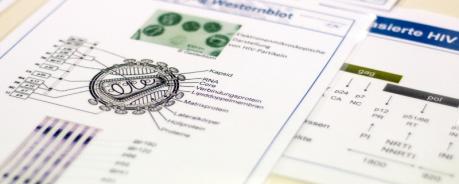
HIV is an abbreviation and means “Human Immune-deficiency Virus.” That translates to human immune weakness virus. HIV damages the body’s own defenses, also known as the immune system.
Thus the body is no longer able to fight off intrusive disease-causing agents such as bacteria, fungi or viruses. In a worst-case scenario, certain life-threatening illnesses can then occur like severe pneumonia, for example. This is known as AIDS.
AIDS is also an abbreviation; it means “Acquired Immune Deficiency Syndrome.”
Today there are very effective medications to fight HIV. They prevent reproduction of the virus in the blood, but are unable to eliminate the virus from the body. Thanks to these medications, most people infected with HIV can live a long time with the virus without contracting full-blown AIDS.
The medications, however, can have severel side effects in some cases, and must be taken for the rest of your life.
Share on






